Greece is a treasure trove of history and mythology, offering an extraordinary opportunity for families to immerse themselves in the world of gods, heroes, and ancient civilizations. This family-friendly guide will help you navigate Greece’s most iconic mythical sites, providing in-depth information, practical travel tips, and engaging activities designed to make your journey both educational and unforgettable. Whether you’re exploring ancient temples, theaters, or palaces, this guide ensures your family adventure is rich in knowledge and full of excitement.
Key Mythical Sites to Visit
1. The Acropolis of Athens
The Acropolis, towering above Athens, is one of the most iconic ancient sites in the world and a UNESCO World Heritage site. It’s an essential stop for families exploring Greece’s rich history and mythology.
What to See:
The Parthenon, Erechtheion, Temple of Athena Nike, and the Odeon of Herodes Atticus.Mythical Significance:
The Acropolis is dedicated to Athena, the goddess of wisdom and war, who became the city’s patroness after winning a contest against Poseidon. The myth states that Athena offered the city an olive tree, symbolizing peace and prosperity, while Poseidon created a saltwater spring. The people chose Athena’s gift, and the city was named after her.Family Tips:
Visit the Acropolis Museum before or after exploring the site. The museum’s interactive exhibits and multimedia displays help kids understand the significance of the artifacts and structures they’ll see at the Acropolis. Consider a guided family tour that includes storytelling to make the myths come alive for younger visitors.

2. Delphi
Delphi, known as the center of the world in ancient Greek mythology, is a must-visit site for families interested in history and prophecy. Once home to the Oracle of Delphi, it’s a place steeped in mystery and legend.
What to See:
The Temple of Apollo, the Theater, the Stadium, and the Tholos of Delphi.Mythical Significance:
Delphi was the most important oracle in ancient Greece, where the god Apollo was believed to communicate with mortals through the Pythia, his priestess. Kings, generals, and common people sought the oracle’s prophecies before making crucial decisions, making Delphi a significant cultural and religious center.Family Tips:
Walk the Sacred Way, the path leading to the Temple of Apollo, and imagine ancient pilgrims doing the same. The site also offers breathtaking views of the surrounding mountains, making it a perfect spot for a family picnic. The Delphi Archaeological Museum is also a must-visit, housing the famous Charioteer of Delphi and other significant artifacts.
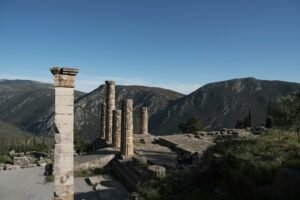
3. The Palace of Knossos, Crete
The Palace of Knossos, located on the island of Crete, is the largest Bronze Age archaeological site in Greece and is often associated with the myth of the Minotaur and the labyrinth.
What to See:
The throne room, the vibrant frescoes, the grand staircase, and the intricate layout of the palace, which many believe inspired the legend of the labyrinth.Mythical Significance:
According to myth, King Minos of Crete kept the Minotaur, a half-man, half-bull creature, in a labyrinth under the palace. Theseus, a Greek hero, was able to slay the Minotaur with the help of Ariadne, Minos’ daughter, who gave him a ball of thread to navigate the labyrinth.Family Tips:
Engage in a guided tour that focuses on the myths and legends of Knossos, making the history accessible and fascinating for children. Many tours include interactive elements like role-playing the story of Theseus and the Minotaur. The nearby Heraklion Archaeological Museum offers additional context with its extensive collection of Minoan artifacts.
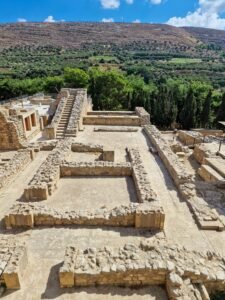
4. Olympia
Olympia, the birthplace of the Olympic Games, is another UNESCO World Heritage site and a key destination for families exploring Greece’s ancient history.
What to See:
The Temple of Zeus, the Temple of Hera, the ancient stadium, and the gymnasium.Mythical Significance:
The ancient Olympic Games were held in honor of Zeus, the king of the gods. The games were not only a display of physical prowess but also a significant religious festival, where athletes competed to honor the gods.Family Tips:
Let your kids run on the track of the ancient stadium where the original Olympic athletes once competed. The site also features the Philippeion and the remains of a training area for athletes. The Archaeological Museum of Olympia is nearby and offers a detailed look at the history of the site, with artifacts such as the famous statue of Hermes by Praxiteles.
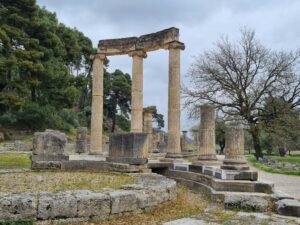
5. Epidaurus
Epidaurus is renowned for its well-preserved ancient theater, which is still in use today, and the Sanctuary of Asklepios, the god of medicine.
What to See:
The Ancient Theater, the Tholos, the Temple of Asklepios, and the remains of the ancient hospital.Mythical Significance:
Epidaurus was a major healing center in the ancient world, dedicated to Asklepios. People came from all over Greece to be cured of their ailments, often spending the night in the sanctuary’s abaton (dormitory), where it was believed that Asklepios would visit them in their dreams and heal them.Family Tips:
Attend a performance at the ancient theater if your visit coincides with a festival. The acoustics are incredible, and it’s a unique experience for children to watch a play in a setting where ancient Greeks once did. The small museum on-site also provides insight into the healing practices and the history of the sanctuary.
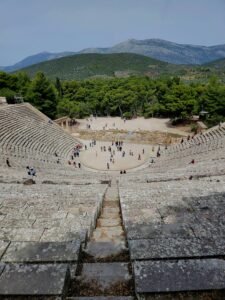
6. Mycenae
Mycenae, one of the major centers of Greek civilization, is linked to the legendary King Agamemnon and the epic tales of the Trojan War.
What to See:
The Lion Gate, the Royal Tombs, the Palace, and the Treasury of Atreus.Mythical Significance:
Mycenae is central to the Homeric epics, particularly the story of the Trojan War. Agamemnon, the king of Mycenae, led the Greek forces against Troy, and his tragic homecoming is one of the most famous tales in Greek mythology.Family Tips:
Explore the site with a focus on the myths of Agamemnon, Clytemnestra, and Orestes. The imposing Lion Gate and the beehive-shaped tombs are particularly impressive for children. The nearby Archaeological Museum of Mycenae provides additional context with its displays of Mycenaean artifacts.
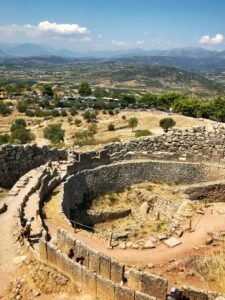
Family-Friendly Activities
Interactive Guided Tours
Why It’s Great:
These tours are designed specifically for families, often incorporating storytelling, role-playing, and hands-on activities that make the myths and history of each site come alive. Engaging with history in this way helps children retain what they’ve learned and makes the experience much more enjoyable.Top Tip:
Look for tours that include elements like treasure hunts or myth reenactments. These interactive components are especially engaging for younger children.
Scavenger Hunts
Why It’s Great:
Turn your visit to each site into an adventure with a scavenger hunt. Children can search for specific artifacts, architectural features, or symbols while learning fascinating facts along the way.Top Tip:
Prepare a list of items or landmarks to find at each site before your visit. Some guided tours also offer pre-made scavenger hunts tailored to the location.
Performances and Reenactments
Why It’s Great:
Many ancient theaters, such as those in Epidaurus and Delphi, host family-friendly performances and reenactments of Greek myths. Watching a play where it was performed thousands of years ago offers a unique and immersive experience for all ages.Top Tip:
Check the schedule of performances at these sites before your visit and book tickets in advance. It’s a great way to end a day of exploration.
Educational Workshops
Why It’s Great:
Engage in workshops where kids can create their own ancient Greek crafts, such as pottery, mosaics, or laurel wreaths. These activities are not only fun but also provide a hands-on way to learn about ancient Greek art and culture.Top Tip:
Look for workshops led by local artisans who can offer authentic insights into the techniques and traditions of ancient Greece.
Cultural Festivals
Why It’s Great:
Attend cultural festivals that celebrate ancient Greek traditions. These events often include music, dance, and food, providing a lively and educational atmosphere for the whole family.Top Tip:
Plan your visit around major festivals, such as the Athens and Epidaurus Festival, where you can experience traditional Greek culture in an authentic setting.

Travel Tips for Families
Plan Ahead
Why It’s Important:
Visiting ancient sites can be more enjoyable if you plan around the busiest times of the day. Early morning visits often provide cooler temperatures and fewer crowds, making it easier for children to enjoy the experience without getting tired or overwhelmed.Top Tip:
Use online resources or apps to check peak times at each site and plan your visit accordingly. Purchasing tickets in advance can also save time.
Wear Comfortable Shoes
Why It’s Important:
Many ancient sites have uneven terrain, rocky paths, and steps, so sturdy, comfortable shoes are essential for everyone in the family.Top Tip:
Pack a small first aid kit with band-aids for any minor scrapes or blisters that might occur during your explorations.
Stay Hydrated and Energized
Why It’s Important:
Greece’s warm climate means it’s easy to get dehydrated, especially when walking around ancient ruins for extended periods.Top Tip:
Carry refillable water bottles, snacks like dried fruits and nuts, and apply sunscreen regularly. Some sites have limited facilities, so it’s best to be prepared.
Accessibility Considerations
Why It’s Important:
Not all ancient sites are easily accessible for strollers or young children. Some areas may have steep climbs or narrow pathways.Top Tip:
Consider using a child carrier for younger kids and check with each site beforehand to understand which areas might be difficult to navigate with a stroller.
Utilize Family-Friendly Guides
Why It’s Important:
Choosing a guide or audio tour that caters specifically to children can enhance their understanding and interest in the site. These guides often include stories, quizzes, and fun facts that keep kids engaged.Top Tip:
Research family-friendly tour operators that specialize in educational trips for children. Some even offer tours conducted by guides in period costumes.
Check for Special Events
Why It’s Important:
Many ancient sites host special events, performances, or workshops that can enrich your visit. Planning around these events can provide unique learning opportunities and entertainment for the whole family.Top Tip:
Follow the social media pages or websites of major sites like the Acropolis or Delphi to stay updated on upcoming events and plan your visit to coincide with these activities.
Encourage Curiosity
Why It’s Important:
Encouraging your children to ask questions and engage with the history and myths of the sites helps deepen their understanding and makes the experience more interactive.Top Tip:
Before your trip, read some Greek myths with your kids or watch family-friendly movies about Greek mythology to spark their interest and curiosity.

To Sum Up
Exploring Greece’s mythical sites with your family offers a unique and immersive educational adventure. From the legendary Acropolis to the ancient healing center of Epidaurus, each site is a window into a world where gods walked among mortals and heroes battled mythical creatures. By following this guide, you can ensure that your family’s journey through Greece is not only informative but also filled with wonder and excitement.
Ready to embark on your family’s mythological adventure through Greece? Book a call with one of our travel experts today to refine your itinerary and ensure that you experience all the must-see attractions and hidden gems Greece has to offer. Create memories that will last a lifetime as you explore the cradle of Western civilization.

